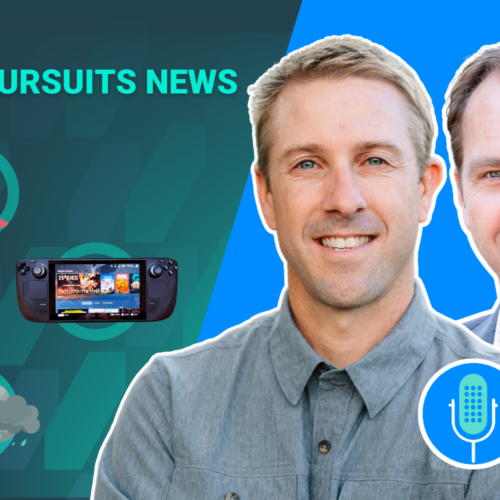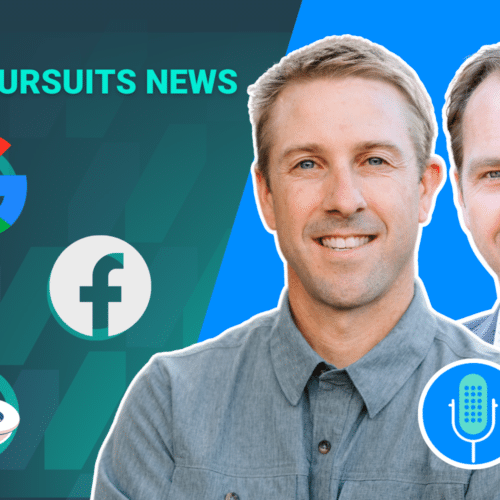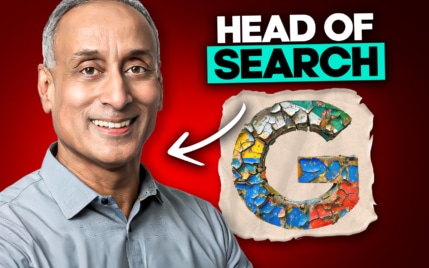The Conclusion of Niche Site Project 4: How I Sold My Niche Site for Over $250,000
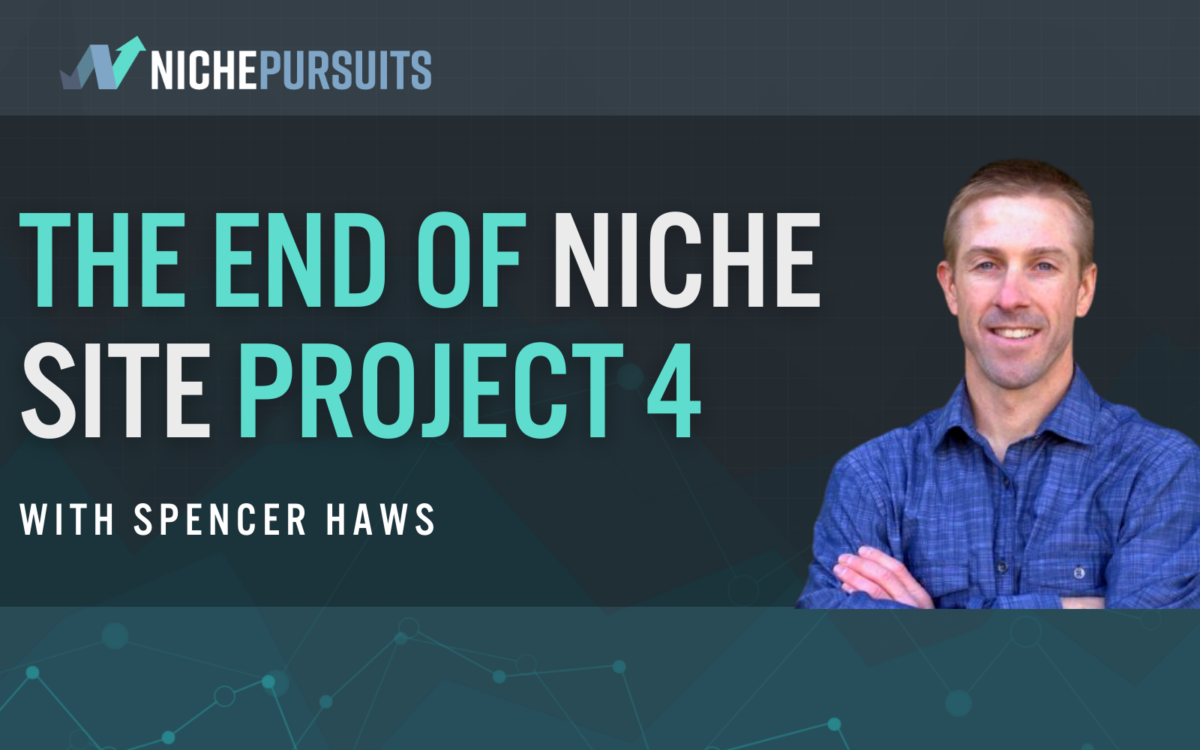
When you buy something through one of the links on our site, we may earn an affiliate commission.
Well, all good things must come to an end, and that's the case for Niche Site Project 4!
I'm excited to announce that I've officially sold OwnTheYard.com, my Niche Site Project 4 site! The site publicly began in September 2018 and was just over 3 years old when it sold.
Today, I want to share why I sold the site, how much I sold it for, and what's next. I was able to sit down with Jared Bauman and record an entire interview to recap the history of Niche Site Project 4, the exit, and all the details.
So, please watch the video below or listen to the podcast recording to get the most in-depth explanation of everything.
Contents
Why Did I Sell Own The Yard?
I sold the site so I could have more mental energy and time to focus on bigger projects. And of course, the cash is nice as well!
I recently recorded a podcast episode with Jared where I explained that I'm doing my best to remove myself as a bottleneck in my own business. That interview really explains many of the reasons that I sold Own The Yard.
I'm attempting to juggle fewer projects at once so that the 1 or 2 big projects that I am focusing on will hopefully scale better as I invest more resources into them.
In addition, I felt like I had gotten Own The Yard to a revenue number that I was satisfied with as a public case study site. The site was averaging about $6,000 a month when I sold it.
I think taking a site from nothing to $6,000 a month in front of thousands of people as a public case study was a big win! I was ready to cash in on that win and remove some of the stress that comes with holding a site that everyone is watching closely.
Own The Yard Sold for About $250,000?!
I sold Own The Yard as a package deal. So, the buyer actually purchased 2 of my sites at the same time.
As a result, Own The Yard wasn't valued just by itself…the buyer bought 2 sites at once for a single price.
In addition, the buyer has requested that I keep a few things private about the sale including the exact multiple and the total exit amount of the 2 sites combined. However, because the buyer knows that Own The Yard was part of a public case study, he's agreed to let me state the below details.
- Own the Yard was sold for greater than a 40x multiple.
- And Own The Yard was averaging around $6,000 a month.
- So, I can state that if Own The Yard had been sold by itself, it would have sold for close to $250,000.
$250k for a public case study site…I'll take it!
A 2 Site Package Deal?
The other site that was sold was my “Mom Blog” that I've written about from time to time. This is a site that I purchased about 3 and a half years ago.
At the time of exit, this site was earning more than twice as much as Own The Yard. So, while I can't state what the total exit price was for the 2 sites combined, I can say that it was significant.
How Did I Sell the Sites?
The sites were sold off-market, but with the help of Motion Invest. Because I'm a partner at Motion Invest, I was able to chat with them and get them involved privately.
Motion Invest was able to reach out privately to a few of their larger buyers in the past and run a potential deal by them. This private outreach led to a potential deal that was VERY close to closing in September.
However, that initial deal fell through.
A second potential buyer was found quickly through private outreach and this was the eventual buyer of the 2 sites.
We officially closed the deal on November 1st, 2021.
Earnings History
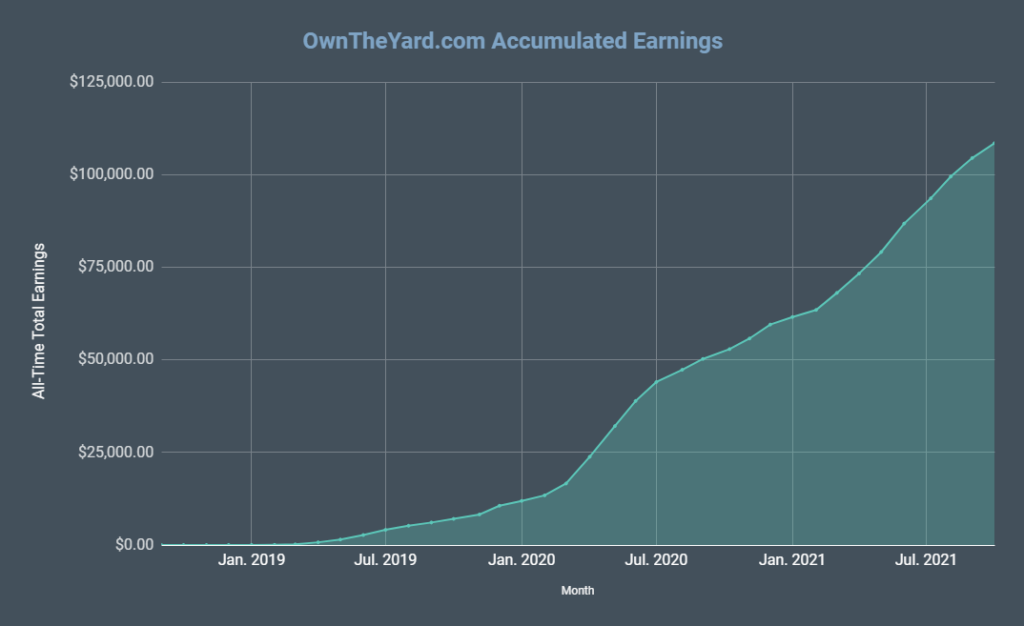
The last full income report that I did for Niche Site Project 4 was for May of 2021. During May, the site earned $5,818.
Here's some additional earning stats for Own The Yard:
- May 2021 – $5,818
- June 2021 – $7,686
- July 2021 – $6,817
- August – $5,873
At this point is when discussions really began to sell the site, which lasted a couple of months before we closed.
The breakdown of the earnings has historically been approximately 40% from Amazon Associates and 60% from Display Ads using Ezoic.
In total, the site earned $108,500 in revenue while I owned the site! See the chart above for the total income growth.
Expenses
No revenue picture is complete without an accounting for expenses. The bulk of the expenses was for content writers for the site.
The site had a total of 656 articles. Many of the articles were 1,000 to 1,500 words long. However, the product reviews or buying guides were often over 3,000 to 4,000 words.
In addition, I hired someone to do all the Pinterest work for me as well. Finally, I did pay for link building a couple of times on the site (from Niche Website Builders and Authority Builders).
Most of the expenses came in the first 2 years of owning the site. In those early days was when I was really scaling the content and links to get the site off the ground.
While my accounting wasn't perfect for the life of the site, a very close approximation of total expenses since September 2018 was $65,000.
Total Profit?
So, here's some quick math for those curious:
- Total revenue over the life of the site: $108,500
- Total approximate* sales price of the site: $250,000
- Total exit + revenue = $358,500
- Total expenses over the life of the site: $65,000
- Total income of $358,500 – $65,000 expenses = $293,500
- $293,500 divided by 3 years = $97,8333 per year
Overall, I'm happy with the way Niche Site Project 4 turned out!
What's Next?
Now that I've sold a couple of my sites, what's next?
Well, here are the current projects I'm now working on:
- Link Whisper
- NichePursuits.com
- A niche site I started in 2012 (undisclosed)
- A site that I acquired 3 years ago
- A new WordPress plugin in development
This exit will give me a little extra time and capital to devote to these other projects. I hope to have a couple of additional exits in the next year or two so that I can continue to narrow my focus and reduce the total number of projects I'm working on.
Will there be a Niche Site Project 5?
No.
I don't expect that there will be a Niche Site Project 5.
I started Niche Site Project 1 in early 2013, and so I've been running public case studies now for about 9 years! While I've enjoyed showing how to build Niche Sites from scratch for all to see, I think it's time to move on.
I've heard from many, many people over the years how much they've enjoyed and learned from these projects. So, I'm extremely grateful that these projects have been beneficial to people as they've built their own businesses.
Don't worry, I'm not going anywhere though!
Niche Pursuits will continue on with even MORE great content, interviews, and insights for online businesses.
If you want to continue to hear more from me, be sure to follow me on Twitter, join the Niche Pursuits Facebook Group, and Join my email newsletter.
Watch the full Interview:
Read the full transcription:
Jared: Welcome back to the Niche Pursuits podcast. My name is Jared Bauman, and today we've got Spencer Haws.
Spencer: Yeah, Jared, it's good to be back. You know, last time we did this, we weren't sure who was going to host and kick it off, but you've clearly won that job. So I'm going to let you take it away and I'm going to just pretend to be another guest on the show today.
Jared: Well, pretend as you will, but today we're not just talking kind of open-ended, we've actually got a pretty focused agenda in front of us today. You know, last time it was real. Free flowing. Just talk about where niche pursuits is and what's been happening in the life of Mitch for pursuits, especially I think it was 20, 21 a year.
We were focusing on today. We're talking own the yard.com and niche project for
Spencer: right. And it's been a long time since I've provided an update. I think it's been about six months. Yeah, no, you're right. It has if I recall. And so I have a lot to share a lot's been going on and this will be. Perhaps the last update for niche site project for
Jared: oh man.
Okay. Now, well, you're coming out and saying it from the beginning and I'm guessing that there's a reason that this might very well be the last niche site project for update. We, we gave, maybe let's do a little bit of a history of the project and the website. And then I know, I think I speak for everyone.
I, when I say the big burning question is why will this be the last update? Yeah.
Spencer: So niche site, project four, I'll give like a 60 second summary here. The first article on the r.com was published in September of 2018. And so I've done four public case studies where I built a niche site from scratch, where I do all the keyword research, share my entire process of finding a niche and building that website in front of everyone on my blog, the Facebook group.
And so that started really September, 2018 and then the site started making some money. I think it was like four months later. And. By the time it hit, I think it was eight or nine months. I was just looking at this when it was about eight or nine months old, it hit about $500 a month in revenue and grew from there.
Right. Continue to grow. And the last update and I shared monthly updates over the years. But that's been now just over three years, right? Since September, 2018, I started publishing less frequent updates, really just because I wasn't doing anything new. Right. I was just continuing to publish some articles.
I had shared the entire strategy. And the last update that I shared, I believe was the income for may of 2021. And the income was about $5,800 that month. And the income continued to do well. We can jump into that, but the big news here is that in September I started looking at potentially selling on the yard and I got some interested buyers, had a couple of people make really serious offers and a deal to sell on the yard.
Dot com did close. The very first week of November of 2021. And so it has been sold. It's a done deal for over two months now. And so I'm finally revealing this for the first time. I am no longer the owner of on the yard and
Jared: it is sold. You took a case site, a case study site grew it, and just, just over three years later, So the site.
And so we'll get into the details. That's now that we've got that out of the hell, we got that out of the way. Can I dive into all the details about in the yard? I have to say, correct me if I'm wrong. I think I remember you posting something in the niche pursuits Facebook group at one point about how you were getting some interested offers, I guess, before we go into all the details of the website, like, were you thinking of selling the site going into fall of 2020, or was it more, some, something where it kind of came out of nowhere and then it caused you to consider the process of selling
Spencer: it?
Always considering selling it, even from day one of building the site, all my projects, I eventually had the goal to sell. And I know that. And so it's not so much a surprise that I was going to sell it. But when right was really just the unknown and the site was about three years old, I felt like it was just time over the summer of 2021.
I kind of felt like, you know, I think it's about time. I've got other projects that I'm working on. And people can listen to actually the previous podcast and perhaps understand some of the reasons it's going to
Jared: say that's going to get a lot of backstory there.
Spencer: A lot of the backstory just reducing my focus from lots of other projects on the yard was a project.
That was not, I didn't want it to be my core focus going forward. And so that, that was a big reason. And so I put the feelers out and. What I did is I went to my team over at motion. Invest people know that I'm a partner there at motion, invest.com. It's a brokerage for buying and selling websites. And I sort of told the couple other founders, Hey, I'm looking at selling not one, but two of my sites.
And would it be possible to sell these as a package deal and to do it privately? And so that's how it came about. I talked to them, David. Kind of the word out on, they contacted some private buyers that they knew were buying bigger sites because I had two sites together and combined it's a large purchase for sure.
And that's when I started getting interested parties. And so I think it was September that I initially first started putting, trying to get offers and I did post in the niche pursuits Facebook group that I was getting some serious offers at that point
Jared: I had. So I'm always curious because like you said, we really talked about.
A big reason why you're sold the site. In the previous episode we did together. And a lot of people come into selling a site because they've hit a certain milestone in terms of revenue or because they've owned it for a certain number of years and they're ready to move on to another project or, you know, so I was just curious to hear what it was.
It really did come back down to putting your time and your efforts into other areas and other projects. And this was one of many things that you kind of we'll call it,
Spencer: got off your. Exactly. And I've always been an entrepreneur at heart, right? Like I'm a starter, you know, I think there's lots of books that kind of talk about the idea person and the implementation person.
Right. I'm really good at getting projects off the ground for the first couple of years. And I just know my skill set of like, I tend to either lose interest or move on to other things, you know, after a couple of years. And so
Jared: it dovetails really nicely with a podcast episode that we just had come out.
With Joe valley about the, his book, the exit preneurs mindset. And basically he has, the whole interview was about, and his whole book is about building in our case, your website, from the beginning, with the idea of selling, even if maybe you would never will sell it, maybe right now, you're not thinking that way, building it to sell is the best way to build it for now anyways, because it allows you to run a better business.
And so it kind of touches on a lot of the things you were taught.
Spencer: Yeah, I've read the expert newer by Joe valley. It's a great book and I definitely resonate really well with the theme of that book of, yeah. Just knowing from the start that you're going to be selling something.
Jared: Okay. So let's catch up to.
Where you were over the summer of 2021, because the last update that had been published was in, I think, may you said, I think may I have some of the numbers in front of me here? The site made $5,818 in may of 2021. So where, what did the site do for the rest of the summer and the summer, by the way, this is a seasonal site, right?
So the summer always does tend to be a big. For own the yard. And I think looking back over some of the numbers from the previous reports, it looks like may, June, and then July are usually the highest earners anyways for the site. But maybe we can talk through like where the site was, that over the summer of 2021, when you started to think about selling it earnings, traffic, number of articles, these kinds of topics.
Spencer: Yeah. And feel free to dive in. With what I miss or anything like that, I'm just pulling up my spreadsheets here. So yeah, May, 2021, it made a $5,800, $5,812, I think, or something June it made $7,683 July. $6,814, August $5,873. And then, you know, that's about when I was looking to sell the site at that point, but yeah,
Jared: I mean, that's that I think anybody would be pretty happy with a site three years old, you know, something that you were doing on the side, not your full time, you know, not something you were devoting your full time.
Making $7,000, seven, $8,000 at peak season. What was the, like, what were some of the metrics behind that split? Was it mostly Amazon? Was it, I think it's predominantly more ad revenue focused or at least around a 50, 50 split. If I remember correctly or close to.
Spencer: Right. Yeah. It really, a lot of the revenue is from ads, display ads, and looking at the last I'm just looking at like the last six months here, the total Amazon revenue over the last six months was just over $14,000.
And his Zoellick was almost $22,000. So it's not quite two thirds display ad revenue, but it's close. So it's a little over half, little less than two thirds of the revenue is, was from a display ads. And it's kind of an interesting strategy because there's so many more informational based keywords that are easier to rank for.
Then there are these product review type keywords that do really well on Amazon. And so. Published a lot of content on the site. I have that number because I know
people
Jared: will ask question and I'm going to ask what the split was, roughly, if you can, between informational versus, you know, monetized or buying guys or whatever, and you want to call it.
Spencer: Yeah. So there was a total number of articles of 656 articles published over that three-year period. The rough split. I don't have an exact breakdown, but it's. Definitely more than 50% is informational articles. It may be as high as two thirds. By the end of the site, I actually started early on the site was a lot more product focused the last year and a half or so.
It was almost not all, but for sure, the bulk was these informational keywords. So.
Jared: I don't want to read into it too much, but if I were reading into that, it sounds like you really saw for some reason or some collection of reasons, like you grew into the idea of publishing information articles. As this site went on, it started off as really a true affiliate style site with affiliate earnings from in this case, Amazon, and then grew into.
The additional components of, of monetizing through three Zohak with all this informational
Spencer: content, right? Yeah. Part of it is just not wanting to be as reliant on Amazon in their, you know, commission changes and things like that. Right. It wasn't
Jared: all the squirrel content that.
Spencer: That did pretty well kind of
Jared: some squirrel.
Yeah. Something about your squirrel content.
Spencer: Yeah. Yeah. I had quite the topical cluster of squirrels. Yeah. It was like, can squirrels eat chocolate? Yes. Can you eat squirrels that you kill in your backyard, man? It was good stuff. You never know the
Jared: money from that. Right? I was going to say, you never know the topics.
You're gonna end up making money.
Spencer: Yeah, I love it. That's that's what keeps me coming back to like building new sites is like, huh, that's an interesting niche I never thought about. Right. So it didn't, it didn't, I was gonna make so much money from squirrel content, but yeah, that was the reason. Try not to be quite as reliant on, on Amazon, like I said, and just that there are so many more opportunities for keywords, just traffic in general from informational.
Jared: This is a bit of a deep dive on that topic. But while I have you on the topic, let me ask you, do you put ads on your buying guides? Zohak on them?
Spencer: I do. Okay. Yeah. I had tested out not having any ads and then put ads on there and I saw like no noticeable change in Amazon conversions. That seems to me that
Jared: going feedback.
I rarely hear someone. Nowadays that has data to suggest that, you know, it would hurt their affiliate revenue to the degree of not making it worth the trade-off. So, yeah, that was just curious there. Okay. So we had, I mean, six mid six hundreds in terms of number of articles, at least a 50, 50 split info to buying guides.
I'm just reading some of my notes here, too. Let's talk about the domain authority, if you will. And. You know, caveat, these are all third-party metrics, right? Whether we use Moz is da domain authority, or I think I always prefer H refs, the Dr. The domain rating, you know, but I know that you had dabbled with some link building on this site, so we can talk about domain rating, link building efforts, and just tackle that entire topic within the.
Spencer: Yeah. And while you're talking, I'm trying to get into my HRS to see what it is. Cause I actually forgot what the domain rating is. Let's see. 38 38. Okay. Okay. So it's a, it's a domain rating of 38, which is solid, you know, for a niche site, you know, I'm looking at a tress here. It's got just shy of 20,000 backlinks total from 9,500 referring domains.
So. You know, ranks for over a hundred thousand keywords. So yeah, it's I did some link building, right. I used a few different services. I think I talked about using niche website builders and their shotgun skyscraper service. So I did do that. I did a little bit of other similar services like that and some other just guest posting, right.
Probably accounts for most of the links that were built. And then lots of other links just occurred naturally, right? Like posting to Pinterest. Right. A lot of those images ended up getting posted somewhere else and would link back to my site. Things like. How big of a deal
Jared: do you fan? This is a very open-ended question, but how big of a deal do you think the link building campaigns you, you did with niche site builders and a couple of others, how much of an impact you think they had on the sites?
You know, success, revenue, that sort of thing.
Spencer: I think it's really important to have a base set of links. You know, when you've got a brand new site, as much as I hate link-building and I typically don't do a ton. Honestly, you do have to get your site to a point where it has a certain amount of authority and that comes through, but through backlinks.
And so I think they were important. So, you know, over the first year kind of getting. This base set of backlinks is critical, so that Google recognizes your site. But AF there that like, even now, like, I really probably wouldn't do any more, like building on my side. I'd just publish a ton of content, but that's just me.
So
Jared: we should all check back in six months. It'll be a Dr. 56.
Spencer: Right? Right. We'll see what the new owner does.
Jared: Who knows, who knows, who knows what we're gonna get into talking about the details of the sale. If you don't mind though, I have some, maybe I don't want to call it rapid fire questions, but just a bunch of questions about some of the details leading up to the site or throughout the sites build, and then leading up to the sale.
If you don't mind. I'm lucky because now that I'm, I'm sitting here and I get to ask the questions like. This project start from the very beginning. I remember listening in, on the call or on the podcast episode when you first launched it and then getting to see the updates. So I feel like I, along with probably a lot of other listeners have really watched this site grow, especially after you kind of revealed the domain or the URL to everyone.
It's a big deal. Not everyone does that in their case studies. And there's just something about being able to go and look at the site that you're referencing and talking about. That's a big deal, but there's some questions I wanted to ask along the way. So I jotted them down. Let's let me, let's dive into them.
So you already teased it a bit. How big of a role did Pinterest play on this site? And the reason I really want to ask now is because Pinterest is really changing and evolving quickly for SEO. And do you think you kind of caught lightning in a bottle? Do you think that it, you know, is it still doing as well on Pinterest?
Is that as viable of a strategy? So Pinterest in general, what kind of role do you think it played for this.
Spencer: Yeah, Pinterest was a big role. I put a lot of effort into regularly pinning images and building that up. I think it led to a decent amount of traffic. And I was just going to try to pull up the analytics, which I still have access to then fully, you know, social traffic.
Accounts now for, at least in the last 30 days, only about 20%. So 80, you know, almost 80% is still organic or other sources. So while it hasn't attributed to like more than half right or anything, I think earlier it was probably close to 25 or 30% of the traffic. It has led to, I think, a lot of other links or mentions on websites, right.
That has helped with the site. So, and certainly early on. Pinterest was a much bigger percentage. Yeah. Because yeah, you can get a lot more traffic quicker. You know, Google can take six months or a year to fully rank your articles. And so early on Pinterest was very important. And then along the way in the last year and a half, there's been a lot of updates to Pinterest where the traffic isn't as great from Pinterest.
It's still, you know, 20% of the traffic, but it wasn't as good as it was.
Jared: Fair enough. Fair enough. Let's see. Okay. So here's a question I had, I was, as I was preparing for today and looking back through some of the old updates, because you were doing monthly updates in the first year, and my sentiment was that this site was taking a while to get going.
And as I read back through some of the updates, it see it, that seemed to be your sentiment as well. When we talked about the numbers just now, though it was earning well over a thousand dollars a month after. Nine 10 months, which isn't too bad. So my question was, why do you think the site took so long to get going yet at the same time?
I'm wondering if that's even as relevant of a question now that we shared those numbers. I think a thousand dollars a month, nine to 12 months in is pretty average to good right now. But anyways, so I'll ask the original question, but with the caveat that as we've talked already today, you know, maybe it didn't take so long to get going.
And we were just kind of caught up in the emotions in the beginning of that.
Spencer: Right. I think I certainly was nervous. Like here I am. I published a site for the whole world to see many thousands of people are looking at this thing. Well, they're just seeing my numbers at this point. They'll see it eventually
Jared: it's 0,
Spencer: 0, 0.
And it's like, ah, like three, four months in a row. I'm like, oh, nobody's going to believe I know what I'm doing anymore. Right. So a lot of it was probably me projecting on everyone else. It's been six months and I've made, I mean, yes, after four months it started making money, but it made $23. Yeah. And then it went down in January 20, 19 to $6 and then it made $15.
Right. And so it was true. So it did feel like, you know, in the first six months it was still like, had made less than $50, but then. In March of 2019, it hit $128. And this is finally the peak, right? It all these zeros and low numbers were also during the winter. Right. And so it finally hit like springtime.
Okay. April it made $565 and then the first name made 740. And then you're right by June, 2019, it hit a thousand dollars and basically stayed above that almost the entire. And so part of it was, it takes six months. It really does, you know, for Google to fully index and sort of, you know, process your site.
And so I think it was both that it, it takes six months, but I don't think it. Took this site any longer than any anybody building a new site should probably expect about the same and
Jared: that's really what I wanted to get at and why I was like, no, I'm going to ask the question because, I mean, I don't think it matters if you've been doing this for 20 years or 20 days, the wait for a site to take off, you can tell yourself as much as you want, but it's going to take six to nine months.
But man, when you're sitting in months, It doesn't matter how much, you know, it's still so demoralizing to weight. It just doesn't matter how many times you've done it. You know, it's like the ad revenue drop-off in RPMs when the year ends and it starts a new year in Q1. You can know that your RPM is going to drop off, but every year it just punches me in the gut.
It doesn't matter if I knew it. It's just so it's kind of funny, but I really wanted to talk about it because it's so true. Like this one felt like it took so long to get going. I remember thinking, yeah. In the first year you echoed it and a lot of your updates. And then here we have, actually, it was, you know, it was doing about what we thought a good site should do.
Okay.
Spencer: Right. Exactly. And again, it's just like, I'm over here crossing my fingers. Like, please, like this is going to work. Right. But I continued to publish content and just doing the things that I knew. Should be done and yeah, it worked and you know, here I am, when I sold the site, it was averaging. I don't think we specifically said, but it was averaging like just over $6,000 a month, the last like six months.
Right. And so, which is a
Jared: great site. It's a great site. That's a great set. Yeah. I'm looking here. It looks like you're about the 12th month was about. Between, I don't know if the 12th month is August or September. Depends on which one you count as the 12th full month, but you're making $1,392. After 11, 12 months, he had about 165 articles live on the site.
I think that's also a good benchmark to bring up, you know, how many articles did you have are live on the site unit gained that to over six. I think he said like 650. So first year was about 164 articles. And then the last couple of years you've ramped up the number of con on the content that was getting.
Right. Let me ask you about the things you think. Cause you've managed, you've built a lot of sites. Now over the years, and specifically with this site with on the yard.com, what really worked, what do you think were kind of its biggest accomplishments as a website? What, what worked well from this site?
You know, compared to maybe
Spencer: other sites, you know, A lot of it was the content strategy, you know, really diving deep into sometimes these more obscure topics and finding just really a unique and low competition keywords like that. That really was a big part of it. And. Consistently publishing and maybe what would be considered a lot of content and a lot of people, you know, 650 articles.
I know some people think of that, like this massive site, it depends on who you talk to. It might be a tiny site. It might be a massive site. Right. But you know, some publishing, you know, 200 articles a year like that. Yeah. Which equates to somebody can do the math, you know, 20 articles a month or whatever.
Yup. Yup. That was a big part of it. Just taken a lot of at-bats. Just getting content out there for a lot of keywords. That was a big part of it. And then when I found that it ranked for a particular niche, like squirrel. Doubling down on them. Right. So I ended up with more than 20 articles, I think on squirrels and other one was tree stumps, I think.
And actually, and so I saw that like squirrels was doing good. So I moved to like other things that you could feed in your backyard, basically like other animals, right. Just your deer, right. Or, you know, raccoons that are in and up in your backyard or whatever. Right. So I think that was a big part of it is like when I found something that works.
Doubling down on that type of content. How much are you pivoting
Jared: when you're watching the site grow? You know, are you keyword planning, six months in advance and you just stick to that and that's how it goes or are you kind of just going a couple weeks at a time and then. W okay. Where's my traffic. Oh, look at that.
Like man, stumps her in. Let's just go all in on stumps. Now, stop the writing on the other stuff. You know, how, how are you measuring that? Yeah,
Spencer: I usually we do call it batches of like 50 articles at a time, which would take a couple of months, right. Two or three months, depending on. Right. And so every two to three months is really when I would reanalyze.
And I'd go back to the stats and say, what content is performing. Well, what's not my initial thought on the site. And it worked out to some degree, it was more of a backyard games and activities site. Like that was the whole, and it's still kind of is right, like playing croquet and Frisbee golf and all, you know, dozens of games.
Right. That was my first pillar article, as I wrote. I don't remember, you know, a hundred plus games you can play in your backyard and that did work. But then I certainly pivoted when I talked about these other, you know, animals and things like that, I would double down on, on that type of content.
Jared: We've had number two on the podcast in the last I'll call it six months or so they talk about, Hey, you got to buy and guide on croquet, you know, or whatever.
Croquet in the backyard writes and informational articles about croaky. Point them up towards either your buying guide build a little bit of a topical authority or a bit of a topical silo on that. I'm paraphrasing what people have just had. I know Calvary went into great detail on it. We've had another, a number of other people talking about how they build topical authority, where you going after just low-hanging competent and low hanging fruit or low competition keywords that fit the backyard space or where you really.
Trying to kind of build a little topical authority. I'm going to write about the croquet. I'll write my buying guide. Let's do a couple of information articles, information articles about playing croquet and kind of hopping around there.
Spencer: I definitely, I was trying to build that topical authority. Right? So you gave a great example.
I did, I do have several articles on croquet. Yep. So, so I would try to use the tradition and the bumper
Jared: and family. We play croquet in the
Spencer: backyard, so nice. It's a good Easter tree. Always
Jared: wins. I think. No one's ever beaten him. Maybe once,
Spencer: well, maybe read some articles on the yard and
Jared: I can show up and say, I feel prepared
Spencer: this year.
That's right. Maybe, maybe they'll get something there that you didn't know about, but sorry, I cut you off. So croquet. Yeah. Yeah. So I definitely did. Topical authority type thing, but then also took some other at-bats right. Just finding other low competition keywords along the way to spread the topics and the coverage of the site.
And then would double down on those. If I saw something, you know, doing well. So it was a little bit.
Jared: Yeah, I know on my website that I might, you know, niche site, I run aside or wherever. I feel like I've been so indoctrinated to go after low competition keywords. And that's my primary strategy. I feel like that's also your primary strategy, but sometimes I have gotten so caught up that I won't even take an at bat at a bigger topic, you know, and I've been encouraged to take a few of bats at those, and I've actually had a couple of those bigger keywords, those bigger ideas work well.
So it's a good reminder, you know, it's a good reminder to not. To take some at bats, even when it might be a little bit of a reach. So yeah, let's talk about what didn't work on this site. If you could, what didn't work when it comes to own the yard, something you tried, something you thought would work, something that you thought maybe it would monetize better.
Maybe you tried an email list and it never went anywhere. Like what didn't work on this.
Spencer: Boy, there probably are lots of things. And I know if I had, re-read all my updates, there are 10, you push
Jared: the, you've pushed those out of your mind now because you didn't
Spencer: forget the bad stuff. I did try to build an email list and that didn't really go anywhere.
And part of it was, I know how much work it is actually to have a good email list. And so I just felt like, you know what, that's probably not. I actually did some paid ads just to see what happened to, to get people on an email. Get them over to the site and that really didn't go anywhere. I'm trying to think of anything SEO wise, that didn't work right.
Boy. I pretty sure I did a whole update on essentially penalties that happened. I was
Jared: going to ask you about, yeah, I was going to ask you about that because it looks like it did get knocked at least once and
Spencer: algorithm. Yep. I think there was, I think I did a whole podcast on it, so maybe we can link to that, but try to find that just basically yeah.
Google updates for whatever reason, it didn't ended up being any links that I built, but I hired somebody to clean up the link audit. You actually got a penalty on this site. Didn't you? There was a penalty on the site. It wasn't just
Jared: an algorithm update. It was a
Spencer: penalty. That's where it was a penalty in Google search console.
Got somebody to clean up all the lens. And I don't remember how many months later, two, three months later that penalty was lifted and traffic started to go back up again. I had totally forgotten about them, whatever. I don't know that what I did still to get that penalty, but that was certainly something that didn't go well that I had to fix.
Jared: Well, I don't remember the timing of it, but could it also be just the downside risk or just the risk of doing a public case studies?
Spencer: Sure. Yeah. Maybe people out there that who knows if they built a bunch of links or
Jared: whatever. That's a good point. Yeah. I remember the, yeah. You mentioned the email list. I mean, yeah.
I think a lot of people that do do think an email list is a great add on, but it's a lot of work is our agency. We do email marketing for a lot of companies and the reason they hire it out is because it's so much work, you know, it's just a lot of work to manage an effective and well engaged.
Spencer: It is to do it right.
You really have to, somebody have somebody focused on it, knows how to write and knows how to make offers, notice how to get people to your website. It's it sounds really easy, but you have to be pretty skilled at it to do it right. Let me
Jared: ask you about this niche site project, which this one's niche site project for.
And I mean, we kinda get a little walk down memory lane here, but I mean, looking back at some of your original niche site projects compared to this one, I mean, what's changed about website building in terms of own the yard. I know we could fill an entire podcast about that, but just, you know, a little. I think it would make, it'd be fun with all the niche site projects that you've done over the years to kind of just look back at some of the ones and what used to work versus what really, I mean, you kinda already outlined what worked here and low competition keywords around topical authority around, you know, a real brandable domain that you grew over the course of.
Three to four years that took a year before. It was six months before was even making a dollar a year before it was really making anything worth writing home about how different is that compared to some of the earlier niche type
Spencer: projects, man, taking a look back, it's been about 10 years. Since I started doing these niche site projects and the niche site project one, I think was 2012.
Maybe it was 2013. So 10 years it's a lot of my life necessarily. I'm not trying to make you late, but a lot has changed. And when I first started exact match domains, where the way to go, and it was really quick, I don't know how fast niche site project one started making money, but I, within a couple of months, I think I was like almost ranking.
You know, at the top of Google, you know, with, you know, for my target keyword and, you know, best survival knife was my first keyword I targeted. So that was a big part of it. Exact match domains ranking quickly, you could get away with building spam, your links, if you will. So the link building was like, I just would hire somebody and they.
I don't even know where they would build links, right. Spit out some links. And that was
Jared: that.
Spencer: So, so it's changed a lot, you know, over the years it's slowly progressed, you know, 2, 3, 4 to more quality, to more content. You know, I went from, I think first niche site project had maybe 20 articles, 25, maybe.
Wow. And that was like, you know, that was it. Like I was, you know, covered everything to, you know, 650 articles. And so there's been a lot of changes on the way along the way. But SEO is still works at the core. It's still targeting low competition. Keywords and links are still important. All of those things are still at the core, but a lot of the tactics I've definitely evolved.
Yeah. It's funny
Jared: because I think out of all the things that have changed exact match domains and back links and, you know, time sandbox, all these things like low competition. At its core really hasn't changed.
Spencer: Right? Yep. Still trying to figure out what, you know, who's ranking at the first page of Google and can you beat them?
Right. And the lower competition, that is the easier it is to beat them.
Jared: So let me throw you a fun question here. If knit, if on the yard had been your sole pro. And you didn't have anything else going on, which again, referenced the last podcast for people to hear what is going on. But if only art had been your, you know, your still your soul project, it was earning, you know, $6,000 a month on average.
And that was what you were focusing on exclusively. Like what would you be doing going forward to it, to grow it? And to there anything that you would've done differently as you were building it, if it had been your sole purpose,
Spencer: Absolutely. If it truly was my sole project, I would have been much more of a hustle blogger.
And I may have mentioned that phrase in our last interview, basically, typically the way I approach these projects is I've got tons going on. And so I have to be almost. You know, person, I hire people to write all the content I hire people to link build, and I don't do a ton of stuff because I don't have the time.
If it was my sole project, I would have been a hustle blogger, meaning I would be reaching out, connecting with people in my niche. I'd be, you know, swapping guests posts. I'd be trying to get featured in other publications. I'd maybe be starting a YouTube channel and actually filming me gardening and or whatever.
Yeah. Catching and eating squirrels. You know, I definitely would have. Super hands-on and doing a lot of that, but at the core, I still would have also expanded the content a lot more would have published more articles, but yeah, that's kind of what I would have been doing for
Jared: sure. That's kind of what I was wondering.
I was wondering if that would, yeah, that was wondering which way you'd go with that. And I think that's great advice for, you know, for people who. Who are listening and, you know, a lot of people aspire to make website building there. They're, full-time their full-time gig, you know, and, and on the yard is a solid platform.
Someone making six, $7,000 a month even quit your full-time job, doing that. And you can make a website at that point. Your full-time interest in.
Spencer: Right. And so yeah, talking about, you know, sort of full-time income, I thought it might be interesting to talk about the total amount of money that the site made over its life.
Oh yeah. And then I think you've probably, I know listeners probably want to know how much I sold the site for. Well, I can tap around that question here a little bit. It's
Jared: good to just draw this out. Cause it keeps, it keeps people listening to the podcast. It keeps engagement high. You know, if you're watching on YouTube does engagement metrics.
Spencer: That's right. If you've made it this far, we'll get to that it's coming around. And so maybe we'll jump into that here, but yeah, no, I'm kidding. Let's
Jared: talk about the sale and let's get to I also, by the way, I didn't ask about the traffic. The site was getting as we neared towards the sale here, because, you know, we talked about how much it was making.
We talked about how many articles were on. We talk about a lot of the other metrics, but I did gloss over and I'm looking back about the traffic, which is a really important number for people listening to.
Spencer: Yeah. So if I'm looking back, you know, the July, you know, it's still, it's doing 120,000 sessions a month, actually let me go to sessions.
If I can that's users. So a hundred and people on the edge of their seat, almost 150,000 sessions a month. Okay. And kind of going down after the peak, you know, the summer is the peak and then, you know, kind of coming out of summer, it's still just over a little over a hundred thousand sessions a month.
But so between a hundred, 150,000 sessions, To give people an idea about when I was preparing to sell the site. Yeah. All
Jared: right. Well, I suppose we've, we've talked details long enough. Let's talk about the sale and let's talk about how you wrap this thing up in a nice, pretty bow and on the yard is, is onto someone else.
Spencer: Yeah. So maybe let me talk about, yeah. So total amount that the site was over the three years. A hundred and almost $109,000 was the total revenue of the site. And I'm gonna re reference this well, okay. I kind of want to get a number of total amount I made after expenses after the sale, and we can calculate that.
So I'm writing it down here. I can do
Jared: these.
Spencer: Yeah. And so the total expense. On the site and this is not perfect. I kept really good expenses for the first 18 months we had to report on it. Yeah. Yeah. And then, so it is right around 65,000, most of that being for content. Right. And then we can talk about the sale.
I mean, so.
Jared: So you probably sold it for what? About a 10 X multiple on monthly earnings and I'm kidding multiple, right? Cause, cause this is 1995, right? No. Yeah. I think I'm as much as you can share, you know, obviously people love to hear numbers now. I think you mentioned earlier that I'd be curious to hear, how, how did that play that you sold?
Did you end up selling multiple sites when you had mentioned, when you went to motion, invest, and the team there that you actually had multiple sites for sale. So that could cause some complications and if you'd sold them to the same person or whatnot, I know this happened happening.
Spencer: Yes. And so I did, I still had multiple sites.
Two sites were sold together as one. And there's a lot of reasons for that, that I guess maybe we don't need to get into, but I wanted it. It basically comes down. I'm trying to eliminate projects. So I decided, you know, if I can tell them both at once, let's do it. And so I found one interested buyer, right?
Both of the sites were similar in that. Display ads and Amazon we're kind of the thing. Right. And found a buyer for. And I'm sold them as a package deal. And as part of the sale, the new buyer did request that I don't share the total amount that the package was sold for. And both of the sites were valued a little bit differently because they brought different things to the table.
The other site that I sold was actually a little over twice as large as on the yard. So it was a bigger site. At a much bigger Pinterest following and just some other details related, you know, to that, that make it a little more complicated to say, okay, on the. This right. Just because it was sold as a package, they didn't buy it individually.
It was just, they bought everything. And there was a lot of things that went into the valuation and they asked that I not share what that total valuation was, but what they did say I could share is that I've already shared the income numbers, right. That it was making roughly a little over $6,000 a month on average, the last six months.
Did sell for over a 40 X multiple without going, you know exactly what that multiple was. You could roughly say that own the ARD sold it. It sold on its own would have sold for about 250,000.
Jared: That's exactly what I was at 40 X and 6,000 ish. Somewhere around the two 50 mark.
Spencer: So again, if it had been sold on its own, that's roughly the range.
It would have been, again, it didn't sell on its own. So this is all sort of conjecture, right. But certainly the amount, the total amount was paid, we can attribute, you know, about 250,000. So I did the math.
Jared: Did the math on, you want to know the total? Yes. After expenses. And your revenue while you own the site, plus the total sale price, you will, you, you ended up at just shy of 300,000, $294,000 of a nice,
Spencer: so over for a public case study years.
Yeah. For a public case study over about three years, that's just not even a year, a thousand dollars a year. Right. Which that's awesome. And
Jared: 5k that you invested. I think it's important to kind of point out, I mean, correct me if I'm wrong. But the 65 K you invested was an investment you made over the course of three years.
We already talked about how you actually ramped up the production of the content in years two and three, not ramped down. Right. And so you spent 65,000. That's about 20, a little over $20,000. A year, which is right around just a little under $2,000 a month. And so obviously for the first year, that was, you were going into the red on that, but you were quickly catching up to that.
I think that it's, this is a pretty doable example for someone with a little bit of a budget or a little bit more time than you had, right. This is a pretty good. Case study, start to finish for someone who has a job and either has some weekends or evenings they can put towards it and then not spend quite as much as you did, or for people who have that budget and say, yeah, I can spend about 30,000 out of the gate and then start taking the profits from the site and reinvesting them.
Spencer: Right. And you know, at the end of the day, that's really what I wanted to show with my niche side project. That's what I've always done is I really wanted to be able to share. That this is doable. And I wanted to do it in an open way, because I know when I was starting, I was always the same way as like, yeah, I see these numbers you're posting about on your blog, but what's your site, is it really, you know, can I, so I've done everything publicly.
People can look at H refs, they can see the sites exactly what I'm doing and hopefully gain some confidence that, Hey, this is real people really can do this. And. I haven't done anything magical. Right. I published 650 articles over three years. It's not a cakewalk. Right, right.
Jared: Yeah, exactly. And that's no, that's a lot.
That's a lot of content.
Spencer: It's a lot of content, but I did outsources. Right. So I shouldn't say that, Hey, I was writing all this content, you know, but somebody can absolutely replicate that right. Over a three-year period. If they're willing to invest. You know, 20,000 a year, or maybe even a little bit more, they can get some solid
Jared: returns and $300,000, you know, I mean, you've had some website exits before, but for someone who's selling a website for the first time, or, I mean, you know, that's definitely in the realm of life-changing kind of income, you know, that's that's real, or they could have hold onto this site and keep growing.
Or they could hold it on the side and maybe what we call cashflow. Right. Just kind of do a little back-off on production of content back off on the investment and just kind of continue to churn out in a site that's built on SEO primarily is, you know, should continue to turn out profit for a good amount of time.
Spencer: Right. It gives you options. Right? A lot of people have talked about sort of the stair-step model of. You know, maybe you build a niche site. And at first year you're hustling and you're investing a little bit of money, but after a couple of years, if you can exit, right. And all of a sudden you've got six figures in your savings account, you can stair step up to maybe a bigger project, right?
Whether that's buying a site or investing more into a new site or starting a software company like I've done, right. You can stare. Up to bigger projects instead of making, you know, five, $6,000 a month, you can double or triple that. Right? Right.
Jared: Yep. So I already know the answer to this, but I know if I don't ask you this, then it's going to be in the comments below when's niche site, project five com who,
Spencer: the tough questions.
Jared: I don't look, it's going to be in the comments if I don't ask it, you know, you
Spencer: know that man, I don't want to disappoint people, but. I guess I'm going to do that. I really don't think there will be a niche site, project five. I really don't.
Jared: I referenced the sun, the Spencer going away into the sunset, the last podcast, which you're not doing, but with niche site project, this might be the farewell tour right here.
Spencer: I think it might be, you know, as great as the projects have been. They really have been in, in, in every regard to every regard, but it's just so much work. I it and, and caused me a lot of angst sometimes. Right. I'm nervous about is my site actually gonna make some money. I've rolled the dice four times.
I'm not sure I'm ready to roll the dice a fifth time. Not because I don't believe it would work out. But for those reasons I've mentioned, right? It's a lot of work. I'd like to focus my efforts on growing in other ways. And I, my niche pursuits is at a point now I don't know that I need to, or that it's going to make a huge impact on growing my audience, even from.
Jared: So, well, plenty of players have come back out of retirement and just know that as those teams, we're quite excited to have those players come back, we would be quite excited. If you ever change your mind, don't worry. You don't have to have any remorse or regret. You can always bring back niche site, project five.
We'd welcome it with open arms.
Spencer: Well, thank you. Thank you. I will keep that in mind.
Jared: But this does feel like a pretty good farewell. I have to say. That was said pretty definitively. So, yeah.
Spencer: And where, where I'm sitting right now? I have no, you know, there's not a desire to do another one and you know, never say never, but I wouldn't expect
Jared: it.
This was, I mean, this was a three plus year. That's when you're signed up for quite a project. When you sign up to do something like this, especially with what we talked about earlier, with how much longer it takes the sandbox indexing ranking, how long it takes to build an authority style site that actually has substantial earnings to it.
It's not just a six month commitment.
Spencer: Right, right. And I know that if I'm going to do it, I'm going to do it right. And so if I feel like I don't want to put in that effort, I, it just doesn't make sense to start something that I'm going to do kind of halfway. And so,
Jared: any final thoughts and on the yard, any final thoughts on a niche site, project four or really niche site project in general.
Spencer: You know, what's really interesting. Just looking over the years, like I said, it's been almost 10 years since I really started doing a niche site projects and niche site, project four being the last one is that SEO still works. Like if you had asked me 10 years ago, like honestly, a part of me even back then, and even part of me is still today is like, how long has this leap loophole of getting free traffic from Google going to last, but it's still here, you know?
So that's sort of, the final thought is like, I don't know how Google, how long Google is going to be around. I think 10 years ago, if you would've asked me is, you know, getting great traffic from Google, going to be a thing in 10 years, I would have said maybe, but it probably won't be as good. If you asked me that today, I'll probably give the same answer.
Will it be around in 10 years? Well, maybe, but maybe it won't be quite as good, but I was proven wrong and you know, hopefully I'll continue to be proven wrong, but as it stands today, You can absolutely replicate what I just did with niche site, project four. I see no reason why that's going to change over the next few years.
You know, like I said, in 10 years, maybe we'll have some new advanced technology and we're all just thinking in our brains and get search results. And, you know, nobody's making any money because we're all in the metaverse, but, but where it is, you know, today, You can replicate this, you can do this, the strategies and the skills required are all there.
You can follow a niche site project for, and also that's part of why. I don't think I need to do niche site, project five. I wouldn't change anything
Jared: and just see a reboot and just be a reboot.
Spencer: Just go read every blog post and watch every video. If you're trying to learn even what I published back in 2018.
It's I wouldn't change anything. It's.
Jared: Yeah, no, that's a good point. I mean, certainly things about SEO are always changing, but the basics have remained fundamentally very constant for the last decade and, you know, barring some seismic shift. There's a good chance that remain pretty, pretty constant for a good little while.
So if you're watching this in years to come, you've just gotten a nice cherry on top of what was a three-year journey. In a great strategy, you know, and a strategy that works now and, you know, the bulk of it will probably continue to work for a good ongoing period of time. And you could, I could flip the tables on you and argue that maybe SEO will be more prominent in 10 years.
No, I mean, I don't want to get into a big topic about it, but look at all the privacy concerns. Look at all the social media networks and how they're consolidating and how they're not providing as much. There's so much that I could argue that says that maybe SEO will grow in the next 10 years. And to also put it at that point, we know that the value of websites in general is going through.
And there's no reason to believe that won't continue to go up as more and more dollars get poured into this space, especially from investors and from funds and stuff. So I could say there's never been a better time to be building
Spencer: a website. Yeah, absolutely. And I wouldn't necessarily argue against that.
Right. Like I. 10 years is a long, it's a long
Jared: time, especially in this
Spencer: game, it's a long time, right? We just don't know what we don't know, but I would strongly argued that in the next three to five years, we're not going to see significant changes. And I personally, when it comes down to it, where am I putting my money?
I am absolutely doubling down on SEO and SEO strategies. I'm just doing it now for niche pursuits. As we talked about, I'm pouring a ton of money into SEO and growing that brand. And so I'm not saying that people shouldn't focus on that over the next three to five years. I just, I honestly don't know what the world will be like in 10 years.
Right. And then also when you look at link whisper, I like, I have a software tool that I'm in, you know, investing money in. It's a growing industry. It's a great industry. I'm getting results. I know others are seeing results from that. And so that's kind of where I'm putting my money and my effort. You know, maybe something seismic will happen in 10 years that we just can't predict.
We'll
Jared: have to see. We'll have to see. Well, it's a great way to sign off. It's a great way to put a, like I said, a cherry on top of niche site, project four and own the yard.com best of luck to the new owner. And it's just been so fun to watch a long in this now, three. I mean, we're getting close to three and a half year journey and so well done.
Well done. That's a great exit. It's a great way to, again, a public case study site, multiple, you know, multiple six figures there. So congratulations well done. And thank you for sharing with all of us along the way, because I know I speak for a lot of people. There's nothing. Better as you learn your craft in this space to see an example site and then understand and hear the strategies that are going into that side.
So thank you for sharing all that with us for less money.
Spencer: Yeah, it is a, it's been a lot of fun to share the journey with everyone. Thank you, Jared, for helping me recap this and ask the questions that I'm sure the audience wants to hear. And I do just want to say thank you directly to all the niche pursuits, listeners and Watchers and readers for following along and sort of putting your trust in me to kind of share what's been happening with them in the yard and sharing the strategies that I've had, both successes and failures.
If you go back and read the blog posts, you know, there's certainly a sort of failing. Along the way. And the one tip that I do like to always leave with people is that I wouldn't look to any one person, even myself to try and copy exactly. Right. Like even though I would recommend you go back and read all the case, study updates.
If you're trying to build a new site to try to follow the general strategies, like what's the. General SEO principle or the keyword research, a principle that's being applied here, but don't get too caught in the weeds of like, would Spencer, you know, be, have it this font, or, you know, what do you have as ad in this location?
Or. Nobody knows your site and your business better than you. And this goes for any business. Nobody knows it better than you. And so while you can take advice from sort of the gurus or the experts that are out there, you're going to probably find a better solution. If you sit down and think about it a little bit for your particular unique situation.
So that's the advice that I'd leave with people is that. You know, I hope you've gained a lot of value from niche site project four, but always be willing to try your own strategies or try something a little bit different to see even more growth and potential from your site.
Jared: That's great. That's great advice.
That's great advice. We don't need to worry about whether Spencer says to go after squirrels or deer. Definitely that's right. Yeah. Well, no, but to close on that, I mean, there really is an entire courses worth of information. If you backtrack through all of these and like we said, it's at a strategic level, so applicable, it's all there right here.
And then use this along with your own intuition, create advice.
Spencer: Thank you. Yeah, it's been great chatting about it, Jared. And thank you everybody for listening. It's been great to share my thoughts.
Jared: All right, we'll leave it there. Thank you, Spencer. Until now.
Spencer: Thank you.
Jared: Thanks again to H refs today's show sponsor.
And again, if you're looking for more Google traffic, if you're struggling to rank, you're not sure what to do about it. And the idea of hiring an SEO agency is just outside of your budget. They have a free tool it's called the H refs webmaster. Tools. It's an amazing resource. It's going to help you audit your website.
It's going to prioritize the needed changes you need to make to improve your search rankings. Imagine what you could achieve as more traffic starts to come in beyond the leads and the sales. You're going to have age reps, webmaster tools, helping you analyze your backlinks from other websites. They're going to help you find the important people that are referencing your.
Can help lead to future partnerships, collaborations. You get the hint. The idea of getting Google to work for you sounds a bit too confusing. Age groups also offers a lot of helpful tutorials on search engine optimization. So the time is now it's a free tool and you can go grab it by visiting dot com slash webmaster dash tools.
Again, that's dot com slash web. Dash tools. We've included a link in the show notes. Thanks again to H refs for sponsoring today's podcast. .
Want to learn step-by-step how I built my Niche Site Empire up to a full-time income?
Yes! I Love to Learn
Learn How I Built My Niche Site Empire to a Full-time Income
- How to Pick the Right Keywords at the START, and avoid the losers
- How to Scale and Outsource 90% of the Work, Allowing Your Empire to GROW Without You
- How to Build a Site That Gets REAL TRAFFIC FROM GOOGLE (every. single. day.)
- Subscribe to the Niche Pursuits Newsletter delivered with value 3X per week
My top recommendations

